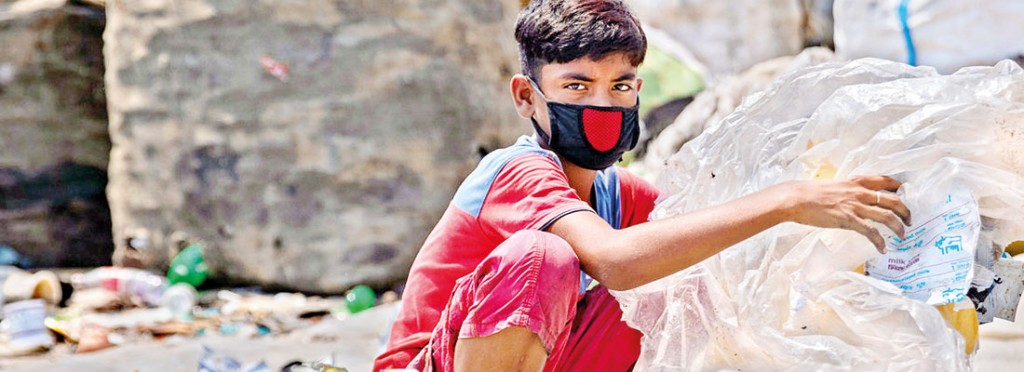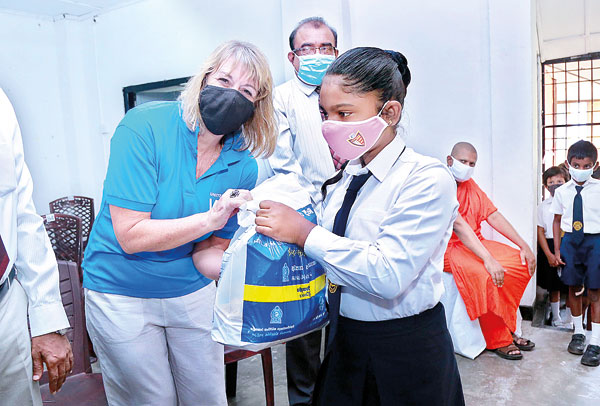Sunday Times 2
Global poverty soars — as Incomes of world’s billionaires hit new highs

Twelve-year-old boy in Dhaka, capital of Bangladesh, sorts through hazardous plastic waste without any protection, working to support his family amidst the coronavirus lockdown. Pic courtesy © UNICEF/Parvez Ahmad
UNITED NATIONS, (IPS) – The phenomenal rise in extreme poverty — for the first time in 20 years — has been accompanied by an upsurge in the incomes of the world’s billionaires and the super-rich.
The paradox of poverty amidst plenty is being blamed largely on the coronavirus pandemic which has driven millions, mostly in the developing world, into a state of perpetual poverty.
As the United Nations commemorated ‘International Day for the Eradication of Poverty’ yesterday October 17, the rich were getting richer and the poor poorer– which may also reflect the realities of widespread economic inequalities worldwide.
The world’s total population is around 7.8 billion, and according to the UN, more than 736 million people live below the international poverty line.
A World Bank report last week said extreme poverty is set to rise this year, for the first time in more than two decades, while the impact of the spreading virus is expected to push up to 115 million more people into poverty.
The pandemic, which is also compounding the forces of conflict and climate change, has already been slowing poverty reduction, the World Bank said.
By 2021, as many as 150 million more people could be living in extreme poverty.
In contrast, the wealth of the world’s billionaires reached a new record high in the middle of the pandemic, primarily as “a rebound in tech stocks boosting the fortunes of the global elite”, according to a report released last week by UBS Global Wealth Management and PwC Switzerland.
Providing a sheaf of statistics, the report said total wealth held by billionaires reached $10.2 trillion last July, described as “a new high”, compared with $8.9 trillion in 2017.
The number of billionaires worldwide has been estimated at 2,189, up from 2,158 in 2017.
The rising earnings were mostly from three sectors, including tech, health care and industry—a trend accelerated by the pandemic.
But the study also says the rise in billionaires has led to greater philanthropy, with some 209 billionaires pledging $7.2 billion in donations.
Professor Kunal Sen, Director of UN University World Institute for Development Economics Research (UNU-WIDER), told IPS the pandemic would push millions of households into poverty, all around the developing world.
“The challenge for the international community is to channelise additional resources through Official Development Assistance (ODA) to low income countries, where global poverty is concentrated”.
“The UN can play an important role in mobilising resources for financing the efforts of the member states to counter the effects of the pandemic on the poor and vulnerable in their own countries”, said Dr Sen, who is also a professor of development economics at the Global Development Institute, University of Manchester, UK.
The projected rise in poverty has also undermined one of the UN’s 17 Sustainable Development Goals (SDGs) which had targeted the eradication of extreme poverty and hunger by 2030.
According to the World Bank, “extreme poverty” is defined as living on less than $1.90 a day. The projected increase in poverty would be the first since 1998, when the Asian financial crisis shook the global economy.
Before the pandemic struck, the extreme poverty rate was expected to drop to 7.9% in 2020. But now it is likely to affect between 9.1% and 9.4% of the world’s population this year, according to the bank’s biennial ‘Poverty and Shared Prosperity Report’.
“The pandemic and global recession may cause over 1.4 percent of the world’s population to fall into extreme poverty,” said World Bank Group president David Malpass.
He said that to reverse this “serious setback”, countries would need to prepare for a different economy post-Covid, by allowing capital, labour, skills and innovation to move into new businesses and sectors.
Malpass said World Bank support would be available to developing countries “as they work toward a sustainable and inclusive recovery”, with grants and low-interest loans worth $160 billion to help more than 100 poorer countries tackle the crisis.
Ben Phillips, author of ‘How to Fight Inequality’, told IPS the concentration of wealth amongst a handful of oligarchs, and the spread of impoverishment to hundreds of millions more people, are not the disconnected coincidences that the super-rich claim, but are two sides of the same bad penny.
He said COVID-19 has not created obscene inequality, but it has supercharged it. In this systemic crisis, the healing impact of philanthropy will be no greater than a novelty sticking plaster on a gaping wound.
As the Pope, the UN Secretary-General, the President of Ireland and the Prime Minister of New Zealand have all pointed out, there is only one non-disastrous way out of this, and that is a rebalancing of economies to serve ordinary people, he noted.
“That is absolutely doable — indeed, we’ve done it before — but markets cannot self-correct, and elites never bestow a fair economy from on high. Only pressure from ordinary people can win an economy that is humane and safe,” declared Phillips.
| Nobel peace prize is not for WFP alone By WFP Executive Director David Beasley ROME – The awarding of the Nobel Peace Prize to the World Food Programme (WFP) is a humbling, moving recognition of the work of WFP staff who lay their lives on the line every day to bring food and assistance for close to 100 million hungry children, women and men across the world: People whose lives are often brutally torn apart by instability, insecurity and conflict. Every one of the 690 million hungry people in the world today has the right to live peacefully and without hunger. Today, the Norwegian Nobel Committee has turned the global spotlight on them and on the devastating consequences of conflict. Climate shocks and economic pressures have further compounded their plight. And now, a global pandemic, with its brutal impact on economies and communities, is pushing millions more to the brink of starvation. The Nobel Peace Prize is not WFP’s alone. We work closely with government, organisations and private sector partners whose passion for helping the hungry and vulnerable equals ours. We could not possibly help anyone without them. We are an operational agency and the daily work of our staff each day is driven by our core values of integrity, humanity and inclusion. Where there is conflict, there is hunger. And where there is hunger, there is often conflict. Today is a reminder that food security, peace and stability go together. Without peace, we cannot achieve our global goal of zero hunger; and while there is hunger, we will never have a peaceful world. Statement from WFP Sri Lanka  Ms. Brenda Barton, Country Director, WFP Sri Lanka, handing a take-home ration pack to a student in Kalapaluwawa. WFP is the largest humanitarian organisation in the world. Last year, it assisted 97 million people in 88 countries. Two-thirds of WFP’s work is in conflict-affected countries where people are three times more likely to be undernourished than those living in countries without conflict. There can be no lasting peace when children are hungry. By saving lives during times of crisis and changing lives in times of peace, WFP is delivering an invaluable service to humanity. WFP was recognised “for its efforts to combat hunger, for its contribution to bettering conditions for peace in conflict-affected areas and for acting as a driving force to prevent the use of hunger as a weapon of war and conflict”, said Berit Reiss-Andersen, chair of the Norwegian Nobel Committee. The COVID-19 crisis has added to global food insecurity with an increasing number of people going hungry. The pandemic, with its brutal impact on economies and communities, is pushing millions of people worldwide to the brink of starvation. Globally and in Sri Lanka, WFP focuses on emergency assistance, relief and rehabilitation, development aid and special operations. In Sri Lanka, WFP has worked with the Government and other partners to save lives and livelihoods and make profound changes to ensure people have better access to food and nutrition. “For more than half a century, WFP staff have dedicated themselves to helping communities in Sri Lanka, from assisting during the tsunami and post conflict period, to providing nourishing school meals to children,” says Brenda Barton, WFP Country Director in Sri Lanka. “We are profoundly honoured that WFP has received this award, which is in recognition of WFP staff worldwide including those in Sri Lanka, who work tirelessly to develop a better future for vulnerable communities everywhere’. | |

